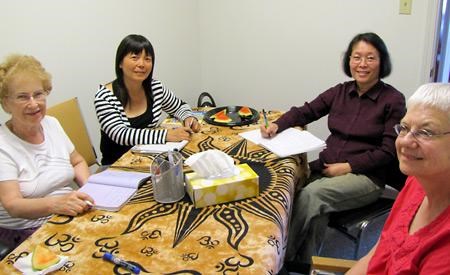There is something to be said for living always within the town of birth, where relatives and friends are close by and accessible. Sometimes, however, circumstances require moving to a new place where everybody is a stranger and life must be rebuilt.
Becoming part of a new community takes courage, patience, and perseverance. It also requires acceptance and support from established residents.
Powell River is commonly described as friendly. However, according to the Vital Signs report produced by the Powell River Community Foundation, 65 per cent of immigrants from other parts of Canada and elsewhere in the world rated “opportunities for employment and community belonging” as fair to poor.
Sara Blum, Powell River Diversity Initiative (PRDI) coordinator, attributes this disparity partly to a limited understanding about what moving to a new place entails. The emotional turmoil that accompanies major life changes is well documented in psychology literature. Initial anticipation and excitement can change to fear and disillusionment as the magnitude and reality of the change sink in. Depression and withdrawal may follow; but positive intervention can lead to acceptance.
“No matter where people have come from or how much they want to live here, an uncomfortable transition period is almost inevitable,” said Blum. This may be brief for those who easily connect with people and make new friends. “For others, the transition is huge. They may need to learn a new language, a new culture, even adapt to new food.”
One resident, who left her homeland 35 years ago, still shows true sadness when speaking of her early years here. “I cried every day. People I met were always so busy with their own lives.” The mother of a family that arrived in 2006 cannot conceal her tears as she recalls how her teenage daughter would “cry every time because she didn’t have any friends.” Today she claims “I love Powell River. I am happy in my life,” but the transition was hard.
How do people ultimately find satisfaction with their new lives?
Powell River Employment Program Society delivers several services to assist new residents. The Learning Centre offers programs in adult literacy and language skills, including an English Second Language Settlement Assistance Program (ESLSAP). It also houses PRDI whose mission is “...to foster an inclusive and safe community.”
Family Place provides a venue for families with small children to meet. “Children are a great conduit for community connections,” said Jean Mackenzie, coordinator. “I’ve watched barriers break down and wonderful friendships develop through parents’ common interests.”
Blum and her colleagues are pleased Powell River can offer these supportive programs, but they agree formal programs are only part of the picture. Real integration requires personal connections between newcomers and established residents. “Newcomers who reach out to the community, join clubs or volunteer will have an easier time,” said Blum. Unfortunately, to those who are shy or have a language barrier, “reaching out can be overwhelming,” she added.
People who already make Powell River home can make a difference; in fact, they can be instrumental in helping newcomers through a difficult time, claims Kelli Henderson, ESLSAP coordinator. Small efforts go a long way. She suggests inviting someone to a community event; introducing them to other people with common interests; including them in a neighbourhood gathering. Parents can encourage their teens to befriend international students. “We have so much to learn from each other,” said Henderson. “As I teach, I’m constantly learning.”
Never underestimate the significance of small gestures, suggests one newcomer. “I first lived at Palm Beach. It was beautiful but I was isolated. I didn’t know anyone, had no car and was looking for work. Eventually, I called a local friend of a friend. This kind person took me, a total stranger, for coffee, told me about the town, put me in touch with other people and even drove me home. I was truly grateful. This welcoming act was instrumental in my decision to stay here.”
Newcomers will continue arriving. As a community, everyone can think about individuals and organizations that can support them. Reaching out will help make Powell River a richer community.
This is the second in a series of articles that explore some of the 12 key areas covered in the Vital Signs report. In October 2011, Powell River Community Foundation released Vital Signs, an examination of social, economic and environmental factors that affect the vitality of the Powell River region. The complete report is available online.



